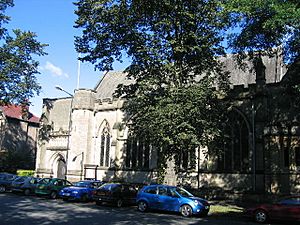Holy Trinity Church, Leamington Spa facts for kids
Quick facts for kids Holy Trinity Church, Leamington Spa |
|
|---|---|

Holy Trinity Church, Leamington Spa
|
|
| Denomination | Church of England |
| Churchmanship | Central |
| History | |
| Dedication | Holy Trinity |
| Administration | |
| Parish | Leamington Spa |
| Diocese | Coventry |
| Province | Canterbury |
Holy Trinity Church in Leamington Spa, England, is a special building. It is a Grade II listed building, which means it's an important historical place. This church is a parish church, serving the local community.
History of Holy Trinity Church
The idea for Holy Trinity Church began in 1825. It was planned as a "daughter church" to All Saints' Church. This means it was a new church built to help serve a growing community.
The church officially opened its doors in 1847. A person named Mitchell from Leamington Spa designed the building. He was asked to do this by Reverend John Craig, who was the vicar of All Saints' Church at the time.
Over the years, the church grew and changed. In 1865, it was made larger. More work happened in 1881 when parts of the church, called the transepts, were expanded. A new room, known as a vestry, was also added by John Cundall.
In 1899, Holy Trinity Church became its own official parish. This meant it had its own area and community to serve. The church's porch and the east wall of the chancel were built in 1900. More changes were made just before the First World War began.
The Church Organ
Holy Trinity Church has a very large and impressive pipe organ. This organ has four "manuals," which are like keyboards. It was first built in 1880 by a company called Forster and Andrews.
Over its long history, the organ has been rebuilt and repaired many times. This helps keep its beautiful sound alive for generations.
Organists at Holy Trinity
Many talented musicians have played the organ at Holy Trinity Church. These people are called organists. They lead the music during church services. Here are some of the organists who have played there:
- 1939 - 1949 Stanley Vann
- Martindale Sidwell (a temporary organist during the war)
- 1949 - 1956 Harold Dexter
- 1956 - 1957 Peter Hurford
- John Cooper
- Frank Antony Ernest Randle
- Adrian Moore
- 2021–present Kerry Beaumont
 | Jackie Robinson |
 | Jack Johnson |
 | Althea Gibson |
 | Arthur Ashe |
 | Muhammad Ali |

